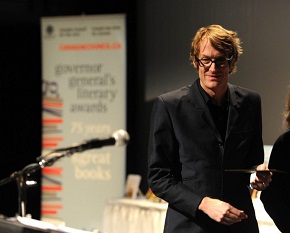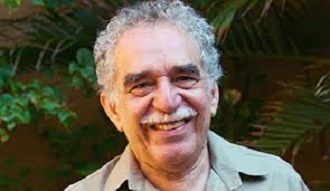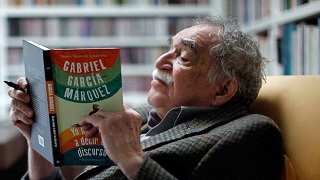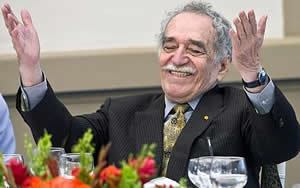Dolce far niente – Bij Aswoensdag
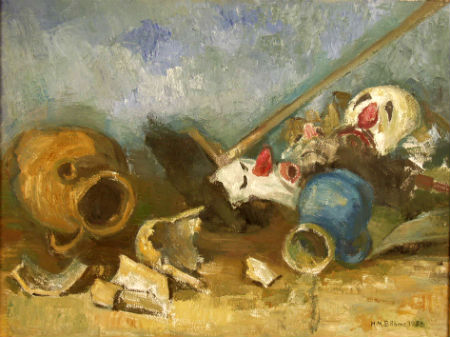
Aschermittwoch II door Hildegard Böhme, 1982
Ash Wednesday
III
At the first turning of the second stair
I turned and saw below
The same shape twisted on the banister
Under the vapour in the fetid air
Struggling with the devil of the stairs who wears
The deceitul face of hope and of despair.
At the second turning of the second stair
I left them twisting, turning below;
There were no more faces and the stair was dark,
Damp, jaggèd, like an old man’s mouth drivelling, beyond
repair,
Or the toothed gullet of an agèd shark.
At the first turning of the third stair
Was a slotted window bellied like the figs’s fruit
And beyond the hawthorn blossom and a pasture scene
The broadbacked figure drest in blue and green
Enchanted the maytime with an antique flute.
Blown hair is sweet, brown hair over the mouth blown,
Lilac and brown hair;
Distraction, music of the flute, stops and steps of the mind
over the third stair,
Fading, fading; strength beyond hope and despair
Climbing the third stair.
Lord, I am not worthy
Lord, I am not worthy
but speak the word only.

T. S. Eliot (26 september 1888 – 4 januari 1965)
De basiliek van St Louis, de geboorteplaats van T. S. Eliot
De Canadese schrijver en scenarist Patrick deWitt werd geboren op 6 maart 1975 op Vancouver Island. Zie ook alle tags voor Patrick deWitt op dit blog.
Uit: The Sisters Brothers
“Charlie climbed onto Nimble and we rode away, heading for the Pig-King. It had been only two months since our last visit to Oregon City but I counted five new businesses on the math street and each of these appeared to be doing well. ‘An ingenious species,’ I said to Charlie, who made no reply. We sat at a table in the back of the King and were brought our usual bottle and a pair of glasses. Charlie poured me a drink, when normally we pour our own, so I was prepared for bad news when he said it: ‘I’m to be lead man on this one, Eli.’ `Who says so?’ `Commodore says so.’ I drank my brandy. ‘What’s it mean?’ `It means I am in charge.’ `What’s it mean about money?’ `More for me.’ `My money, I mean. Same as before?’ `It’s less for you.’ `I don’t see the sense in it.’ `Commodore says there wouldn’t have been the problems with the last job if there had been a lead man.’ `It doesn’t make sense.’
`Well, it does.’ He poured me another drink and I drank it. As much to myself as to Charlie I said, ‘He wants to pay for a lead man, that’s fine. But it’s bad business to short the man underneath. I got my leg gouged out and my horse burned to death working for him.’ `I got my horse burned to death, too. He got us new horses.’ `It’s bad business. Stop pouring for me like I’m an invalid.’ I took the bottle away and asked about the specifics of the job. We were to find and kill a prospector in California named Hermann Kermit Warm. Charlie produced a letter from his jacket pocket, this from the Commodore’s scout, a dandy named Henry Morris who often went ahead of us to gather information: ‘Have studied Warm for many days and can offer the following in respects to his habits and character. He is solitary in nature but spends long hours in the San Francisco saloons, passing time reading his science and mathematics books or making drawings in their margins. He hauls these tomes around with a strap like a schoolboy, for which he is mocked. He is small in stature, which adds to this comedy, but beware he will not be teased about his size. I have seen him fight several times, and though he typically loses, I do not think any of his opponents would wish to fight him again. He is not above biting, for example. He is bald-headed, with a wild red beard, long, gangly arms, and the protruded belly of a pregnant woman. He washes infrequently and sleeps where he can—barns, doorways, or if need be, in the streets. Whenever he is engaged to speak his manner is brusque and uninviting. He carries a baby dragoon, this tucked into a sash slung around his waist.”
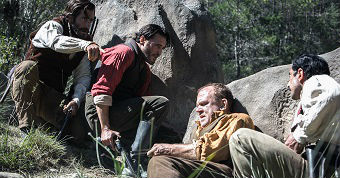
Patrick deWitt (Vancouver Island, 6 maart 1975)
Scene uit de gelijknamige film uit 2018 met Jake Gyllenhaal (John Morris), Joaquin Phoenix (Charlie), John C. Reilly (Eli) en Riz Ahmed (Hermann Kermit Warm)
De Nederlandse rapper, columnist, schrijver en acteur van Ghanese afkomst Akwasi Owusu Ansah (artiestennaam Akwasi) werd geboren in Amsterdam op 6 maart 1988. Zie ook alle tags voor Akwasi op dit blog.
voicemail
hallo
is dit je voicemail
ik wilde eigenlijk iets inspreken
is het goed als ik bel
en je dan niet opneemt
dat praat wat makkelijker
moeder
we zien elkaar steeds meer via de telefoon
en steeds minder in het echt
ze heeft genoeg van haar moederskindje gehoord
dus besluit ze op te hangen in zijn oor
ik dacht eerst dat het lag aan een slecht netwerk
nu weet ik wel beter
wanneer ze de verbinding verbreekt
wil ze het er even niet over hebben

Akwasi (Amsterdam, 6 maart 1988)
De Colombiaanse schrijver Gabriel García Márquez werd op 6 maart 1928 in de kustplaats Aracataca geboren. Zie ook alle tags voor Gabriel García Márquez op dit blog.
Uit: The General in His Labyrinth (Vertaald door Edith Grossmann)
“José Palacios, his oldest servant, found him floating naked with his eyes open in the purifying waters of his bath and thought he had drowned. He knew this was one of the many ways the General meditated, but the ecstasy in which he lay drifting seemed that of a man no longer of this world. He did not dare come closer but called to him in a hushed voice, complying with the order to awaken him before five so they could leave at dawn. The General came out of his trance and saw in the half-light the clear blue eyes, the curly squirrel-colored hair, the impassive dignity of the steward who attended him every day and who held in his hand a cup of the curative infusion of poppies and gum arabic. The General’s hands lacked strength when he grasped the handles of the tub, but he rose up from the medicinal waters in a dolphinlike rush that was surprising in so wasted a body.
“Let’s go,” he said, “as fast as we can. No one loves us here.”
José Palacios had heard him say this so many times and on so many different occasions that he still did not believe it was true, even though the pack animals were ready in the stables and the members of the official delegation were beginning to assemble. In any event, he helped him to dry and draped the square poncho from the uplands over his naked body because the trembling of his hands made the cup rattle. Months before, while putting on a pair of chamois trousers he had not worn since his Babylonian nights in Lima, the General discovered he was losing height as well as weight. Even his nakedness was distinctive, for his body was pale and his face and hands seemed scorched by exposure to the weather. He had turned forty-six this past July, but his rough Caribbean curls were already ashen, his bones were twisted by premature old age, and he had deteriorated so much he did not seem capable of lasting until the following July. Yet his resolute gestures appeared to be those of a man less damaged by life, and he strode without stopping in a circle around nothing. He drank the tea in five scorching swallows that almost blistered his tongue, avoiding his own watery trail along the frayed rush mats on the floor, and it was as if he had drunk the magic potion of resurrection. But he did not say a word until five o’clock had sounded in the bell tower of the nearby cathedral.”
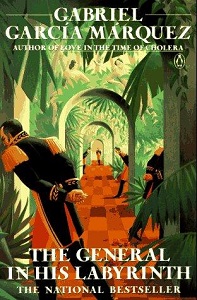
Gabriel García Márquez (6 maart 1928 – 17 april 2014)
Cover
De Nederlandse dichteres Marijke Hanegraaf werd op 6 maart 1946 geboren in Tilburg. Zie ook alle tags voor Marijke Hanegraaf op dit blog.
Vertrek
Mathilde trok achter de kat aan.
Geduldig wachtte hij op iedere hoek.
Gloednieuw klonken de klinkers
onder de driewieler van Mathilde.
Ze reed de Proefsteen uit
vertrouwde straat met de verbanden
die we huizen noemen, dreef
van haar kamertje vandaan.
Onafgebroken verschilde ze
van de Mathilde in het kamertje:
ze rekt haar genen, volgt haar gids.
Hij is bekwaam, zit wijd in zijn geur
verdraagt verkeer. Hij waagt, is niettemin
voorzichtig tot op het schichtige.
Hij likt de stenen.
Kruiswegstatie
Aan een roede hangt een doek.
Het werpt zijn schaduw op de muur
en er is schaduw ingeweven.
In vezels, de allerfijnste
staat tegenover zijn moeder
een kind op sterven en nu
is hun ontzetting draad na draad
door het doek gehaald.
Zit er schuld in de structuur.

Marijke Hanegraaf (Tilburg, 6 maart 1946)
De Engelse dichter en schrijver Jeremy Reed werd geboren op 6 maart 1951 op Jersey. Zie ook alle tags voor Jeremy Reed op dit blog.
Uit: The Nice (Vertaald door pociao)
„20. Juni 1964. Der DJ des Scene Club, total high, unterhielt sich draußen im Ham Yard mit einem Speed-Dealer über James Browns »Night Train«, so schnell, dass man den Stoff fast hören und den schwindelerregenden Schub in seinen Adern verfolgen konnte. Guy Stevens, in einem schwarzen italienischen Wollanzug, cool wie ein Pinselstrich, weißes Hemd, schmale schwarze Lederkrawatte, quasselte ohne Punkt und Komma: Prince Buster, The Supremes, The Temptations. Ein Trupp Mods der zweiten Welle, abschätzig »Tickets« genannt, stand in Grüppchen hier draußen, alle sorgfältig aufgemacht, voll im Trend, aber schon aufgrund ihrer Zahl hatte man ihnen den Zugang zu dem überfüllten Kellerclub verweigert. In der warmen Dunkelheit von Soho konnten sie den rauen, subversiven Klang von Mick Jaggers Harmonika hören: ein gesetzloses Geheul von eingeübter Anarchie, ein rhythmisch mit Maracas vorwärtsgepeitschtes Remake von Buddy Hollys Stück »Not Fade Away«, all die geballte, primitive Kraft des punkigen R&B der Sixties. Face, der an der Tür stand und versuchte, etwas mitzukriegen, erkannte beim ersten Ton den smarten Londoner Sound, besser als Motown, Ska und importierter Rhythm and Blues, das war pures Dartford, eine Südlondoner Blues-Version, die das Publikum anstachelte, bis es anfing, die Bühne auseinanderzunehmen.
Die Stones konnten keinen Set von Anfang bis Ende durchhalten; die Clubleitung pfiff sie nach zwanzig Minuten aus Sicherheitsgründen unweigerlich zurück. Nicht nur der Sänger, silberner Crewneck, weiße Hüfthosen, geschminkte Lippen wie eine Wunde, auch der spöttisch grinsende Gitarrist, die Augen hinter blonden Fransen versteckt, der dem Publikum in regelmäßigen Abständen sein Tamburin ins Gesicht schlug, lösten bei den Fans ein absolutes R&B-High aus. Das Phänomen Jagger, schlaksig, sexy, optimaler Inbegriff von Affektiertheit, war einfach unnachahmlich. Faces wollten nicht so aussehen wie er, sie hatten ihren eigenen Stil, aber seine berechnende, tänzelnde Unverfrorenheit faszinierte sie.“

Jeremy Reed (Jersey, 6 maart 1951)
Cover
De Nederlandse cabaretier, acteur, schrijver en zanger Thomas Acda werd geboren in Amsterdam op 6 maart 1967. Zie ook alle tags voor Thomas Acda op dit blog.
Uit: Onderweg met Roadie
“Gebruinde buitenbeesten zijn we geworden. Er is veel gebeurd. Veel zekerheden zijn gesneuveld en er zijn een paar geweldige nieuwe inzichten bij gekomen. Wat een reis. Ik stop om te plassen. Midden op de weg. Mocht er iemand aankomen, dan heb ik nog steeds drie kwartier om af te knijpen en weg te rijden. Roadie blijft deze keer wijselijk weg bij de cactussen en kiest voor een steen. Die is zo heet dat de urine al verdampt is voor Roadie weg drentelt. Ik doe mijn drie shakes — ooit door een rechter in het leven geroepen nadat George Michael betrapt was op homoseksueel contact in een openbaar urinoir in Los Angeles. Of vervelend gestoord werd bij het hebben van seks, als je uit mijn land komt. De rechter in die zaak bepaalde dat je als ‘normale’ man drie keer mocht afschudden. Deed je het vier keer dan stond je je kennelijk af te trekken terwijl je naar plassende mannen keek. Rechters zijn in dit land al heel lang de nieuwe comedians. Met advocaten als aangevers. Teruggekomen bij de auto zit Roadie achter het stuur. Uiteraard. Als altijd klaar om weggestuurd te worden. Ik ga op de bijrijdersstoel zitten en kijk recht vooruit. Een zacht S cooby-Doogeluidje ontglipt zijn keel. Vragende hondenogen kijken me aan. `Nou, rijden, dawg!’ Honden kunnen prachtig vragend kijkend. Als kinderen die eigenlijk al te oud zijn om nog met zo’n kinderachtig gebaar aan te komen. `Ja, jij ja. Of zie jij nog meer lelijke dingo’s die al sinds New York op de bestuurdersplek azen?’ Ik gooi mijn been over de versnellingspook en druk het rempedaal in. Dan start ik de auto. Man, wat kan die hond dom kijken. Ik zet de auto in ‘drive’ en we rijden. Langzaam, en over een weg waar een blind paard nog geen schade kan aanrichten, maar we rijden! Met een hond achter het stuur. Links woestijn, rechts woestijn en voor ons kilometers prachtig Amerikaans asfalt. Ik moet lachen. Zelden heb ik een hond zo dom zien kijken. Voorpoten op het stuurwiel en tong uit de mond. En op dat moment begint Roadie te lachen. Ooit een hond horen lachen? Grommend zwaar en met korte stoten. Een dikke rokerslach. Zo’n vette-vijftiger-in-rode-broek-lach. Veel te vol cognacglas in de hand en waarschijnlijk op een haringparty. Dat geluid, maar dan van een hond. Ik doe Roadie na: ‘Hag hag hag hag!’ Dit vindt hij kennelijk zo grappig dat er ook nog een grijns bij komt. Ik spring de auto uit en ga ernaast joggen. En voor de auto uit, en om de auto heen. Een diesel rijdt vanzelf. Het gaat niet hard, maar dat geeft niets. Ik spring de auto weer in, eruit, over de achterbank heen. En Roadie maar sturen en lachen. Dan spring ik op de achterbank, en laat me rijden. Eindelijk zijn we vrienden, Roadie en ik.”

Thomas Acda (Amsterdam, 6 maart 1967)
Cover
De Oostenrijkse dichteres en schrijfster Ada Christen werd geboren op 6 maart 1839 in Wenen. Zie ook alle tags voor Ada Christen op dit blog.
Aus dunklen Stunden
I.
Was ich gethan und was ich ließ,
Ihr werdet es einst nicht verbuchen,
Wie meines Lebens Rätsel hieß,
Nicht noch in meinem Staube suchen.
Ich weiß, es wird Vergessenheit
Mein Los, wie heute sie mein Hoffen,
Seit einer trostlos langen Zeit,
Die ich durchlebt, zu Tod getroffen.
Vergessen, rasch vergessen wird,
Des heißen Herzens wirres Klagen,
Der Schmerz nur durch die Lüfte irrt,
Den meine Seele stumm getragen.
II.
Mit einem Wort ersteht mir plötzlich
Was hinter mir lag tot und weit ….
Was qualvoll-süß und herb-ergötzlich,
Die Träume meiner Jugendzeit.
Dein Name brach das alte Siegel,
Als jählings an mein Ohr er schlug,
Und wie in einem Zauberspiegel
Wallt nun vorbei der Schemenzug ….
Ach Tote nur! … und schon verschwebend
Mahnt noch dein liebes Angesicht:
Verblute nicht im Kampfe lebend,
Neig still dein Haupt und ringe nicht.

Ada Christen (6 maart 1839- 19 mei 1901)
Cover
Zie voor nog meer schrijvers van de 6e maart ook mijn blog van 6 maart 2018 en ook mijn blog van 6 maart 2016 deel 2 en eveneens deel 3.


